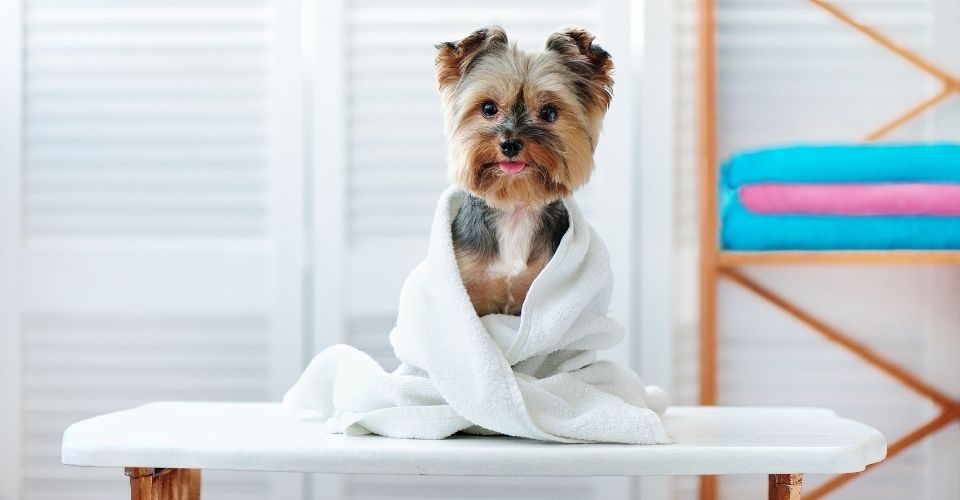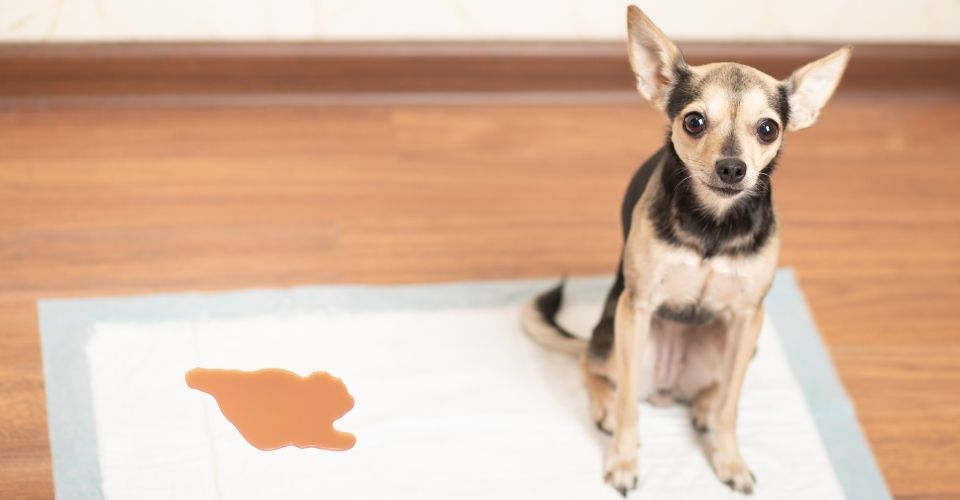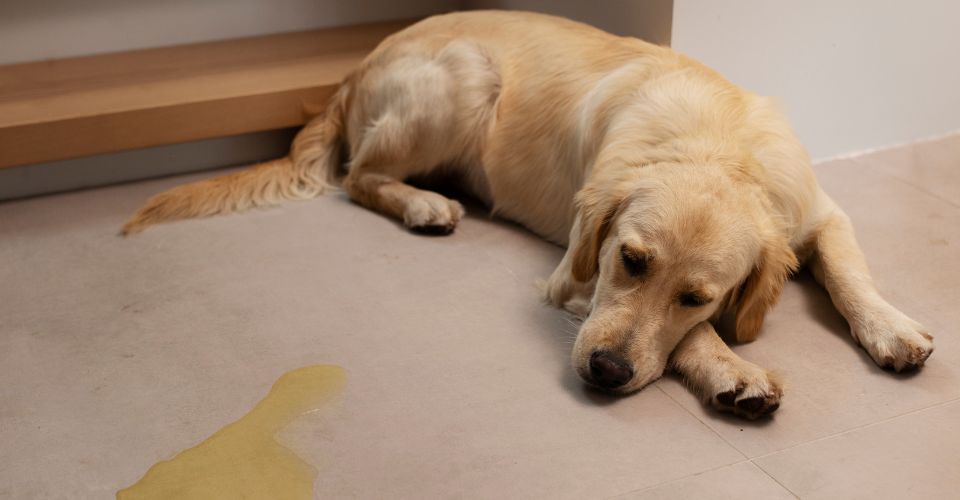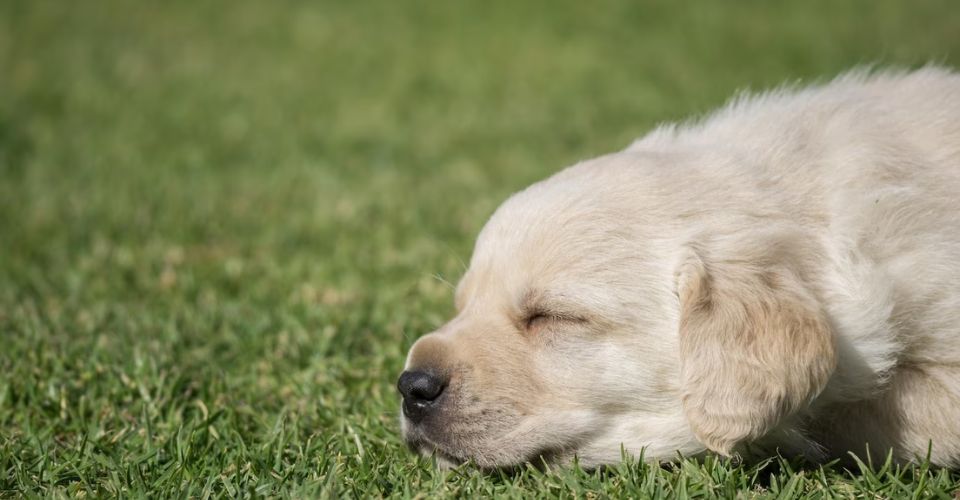During your initial consultation, did you ask the dog breeder, “do Yorkies shed?” And did they say, ‘Nah, they don’t. Yorkies are completely hypoallergenic dogs‘?
Sadly, that is a white lie!
“There’s no such thing as a hypoallergenic dog because all dogs produce the same proteins. It’s those proteins to which you’re reacting. That’s why even a so-called hypoallergenic dog can still trigger an allergic reaction,” says Dr. Jill A. Poole, division chief of allergy and immunology at the department of medicine at the University of Nebraska Medical Center. “It would be more appropriate,” Poole adds, “to call these shedding versus non-shedding dogs.”
Myth busted!
So, do Yorkies shed? The scientific opinion is that yes, Yorkies shed—but shed minimally. Most of the time, you won’t even notice it, and that’s why dog owners say that Yorkies do not shed at all or shed way less than any other dog breed.
How Much Do Yorkies Shed?
Yorkies—short form of Yorkshire Terriers—don’t have an undercoat; thus, they don’t shed much. They have a fine, silky, single-layer coat that resembles human hair. This single layer of hair and low level of shedding make Yorkies essentially hypoallergenic dogs.
Also, their coat layer is somewhat similar to the undercoat on other dog breeds, except that Yorkies do not shed and regrow their coat seasonally.
Dog breeds that shed seasonally produce more dander and create a problem for people sensitive to allergens. On the other hand, Yorkies’ hair continues to grow until they are cut. That’s why they have a longer coat than most dogs have.
They shed gradually, just as humans do, dropping a small amount of hair throughout the year. This low rate of hair shedding makes Yorkies suitable for people with dog allergies as they tend to react less—or not at all—to their hair.
In addition, less shedding means you won’t have to deal with large amounts of dog hair and fur bunnies on your furniture during seasonal shedding cycles—like with shedding dogs.
Moreover, Yorkies will rarely leave stray hair on your clothing.
Why Do Yorkies Shed?
A dog undergoes four phases of hair growth:
- The first phase is the anagen phase in which dogs’ hair grows to its genetically predetermined length.
- The second phase is the catagen phase, a transitional phase in which hair stops growing.
- Telogen, the third phase, is the resting phase, the period where the hair has attained its optimal length and strength.
- Finally, there is an exogenous phase, when old hair sheds to make room for new growth.
However, Yorkies don’t undergo such transitions. Much like human hair, Yorkies shed hair when it undergoes typical cycles—it grows, matures, and eventually falls out. The only difference between Yorkies and other dogs is that they don’t have the exogenous phase.
Causes of Hair Shedding in Yorkies
Other than the natural cycle, there is a multitude of causes that can be responsible for abnormal hair loss in your Yorkie. The following are some of the most likely:
- Yorkies lose hair because of genetic predisposition or inherited hair conditions, such as color dilution alopecia, keratosis nigricans, black skin disease, follicular dysplasia, or congenital hypotrichosis.
- Hormone or endocrine imbalance, which has a genetic component such as Addison’s, Cushing’s disease, hyperandrogenism, hyperthyroidism, or hyperestrogenism.
- The hair fall may also occur because of fleas, lice, ticks, or mites, and other common allergies to parasites.
- Pollutants in the air also cause allergic reactions to chemicals, pollens, dust, or other substances.
- Bacterial skin diseases, especially staphylococcus, affect hair follicles, causing hair shedding in Yorkies.
- Skin cancer is another disease that causes hair death.
- It is possible to have injection site reactions with a variety of medications, such as chemotherapy drugs, vaccines, and injectable medicines.
- Hair loss may be caused by certain medical conditions. A veterinarian will be able to help you learn more about these.
However, there are common diseases that may lead to hair loss, such as hyperthyroidism, which causes the hair to become thin and eventually fall out. Other serious health problems, such as liver problems, kidney problems, low blood pressure, and anemia also cause hair loss in Yorkies.
- Nutritional deficiency or allergy to food items also causes hair fall.
- Lastly, stress disorder and nervous conditions too cause dogs to bite and chew their hair.
Yorkies usually don’t shed a lot, but if the hair fall increases and you notice clumps of hair wherever your Yorkie goes, consult your vet immediately. Otherwise, just stick to the dog’s normal hair care and grooming routine to manage your dog’s shedding.
How to Prevent Hair Loss in Yorkies?
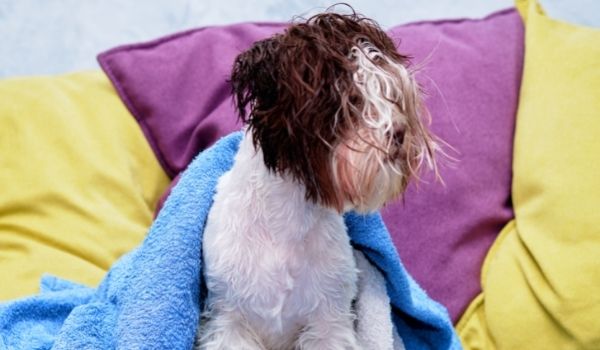
You can prevent hair loss in Yorkies by using the following tips and tricks:
Hair and Skincare
Maintaining clean and moist skin for Yorkies will prevent their hair from falling out. If you see your Yorkie scratching frequently, you should be concerned that parasites may exist, which can adversely affect the growth of new hair and damage the existing ones.
Special care is necessary in order to prevent infections and irritations.
Nutrition
Hair loss can be prevented through a proper diet. Yorkies are generally very energetic and love exercise, but this also means that they need a proper diet—a diet rich in nutrients. Make sure your Yorkie’s food is filled with essential minerals and fats.
When it comes to dog food, you get what you pay for. Good nutrition reduces shedding, so feeding your dog premium quality dog food from a certified manufacturer can help keep loose hair to a minimum. Premium brands use better quality ingredients that provide better nutrition for your dog.
Additionally, make sure to purchase products that list animal proteins as the first ingredient, such as chicken, turkey, beef, lamb, or fish.
Specifically, when it comes to healthy skin, it is important for your dog to consume foods rich in omega-6 and omega-3 fatty acids. Omega-3 fatty acids not only reduce shedding but can contribute to healthy skin, besides providing other health benefits.
You can ask your veterinarian for an Omega-3 product made specifically for dogs, or you can buy a product designed for pets at an authentic and certified pet supply store. Moreover, for better nutrition, pick foods that contain plenty of vitamins B5, E, B3, and A.
Regular Grooming
You must groom a Yorkshire Terrier regularly. If bathing and brushing hair is not your thing, this may not be the dog for you.
Most people make the mistake of bathing their dogs with shampoo for humans. This is dangerous for dogs—only a shampoo designed especially for dogs will be required.
To be specific, look for a moisturizing shampoo because a moisturized scalp means a healthy scalp that will prevent hair shedding in Yorkie.
Shampoo Your Yorkie: Which Shampoo is Best For Yorkies?
Yorkies have no undercoat, which is why they have more sensitive skin, making them prone to potential health challenges. Therefore, it’s important to find the exact products that are specifically designed to meet Yorkie’s grooming needs. We recommend choosing those shampoos with natural ingredients and omega-3 or omega-6 fatty acids—fatty acids that are known to reduce shedding in dogs.
Brush Your Yorkie: Which Brush is Best for Yorkies?
Though you may enjoy the look of free-flowing locks and tendrils of Yorkies, it’s much easier to clip your Yorkie’s hair short and tangle-free. However, if you do get a tangle or knot, don’t use a brush. Carefully untangle the knots with fingers and use a canine conditioner for best results.
Brushes for Yorkie’s Hair
Yorkies need to be brushed often so that the old hair hidden in their coats can be removed. Therefore, using a high-quality brush for grooming is necessary. If the old hair aren’t combed out, they will entwine with the new, live hair, leading to matting and knots.
Dogs have distinctive coats such as wiry, curly, short, coarse, and silky. Each coat type has a specific brush. When it comes to Yorkies who have long silky hair, you can choose one from the following brushes:
Bristle Brushes
This type of brush is a great choice for all coat types. However, for a longer coat, rely on long bristles. These brushes get deeper into the coat and comb Yorkies from the roots.
These bristle brushes are soft and gentle enough to prevent damage to the hair. Thoroughly combing will also help keep your Yorkie’s coat smooth. And if you have clipped your Yorkie’s hair, pick a stiff brush.
Slicker Brushes
These brushes are best used for dogs prone to mats and tangles. If you own a long-haired Yorkie, you are well aware of how much tangling and matting there can be. In that case, use slicker brushes.
Rubber Curry
This comb is good for short-haired dogs and gently massaging dogs’ skin. Rubber curry combs help remove dander, dead skin, and old hair. Besides, they love the feelings this comb sends down their spine.
Blow-Dry Your Yorkie’s Hair
When it comes to grooming long-haired Yorkies, give them a regular bath. And every time you give them a bath, towel-dry him and then blow-dry his coat with a hairdryer. This will dry your dog’s hair quickly and won’t let parasites or dust particles stick to them.
As your dog’s coat gets dry, use a brush to help remove the loose hair. Be sure to slowly brush from the skin outward to get the most hair you can. Keep brushing and drying until your dog is no longer damp.
Clip Your Yorkie’s Hair
Consider clipping his hair if you have a busy schedule and can’t give your Yorkie regular baths and grooming. Also, during hot summers, if your dog has a thick profusion of hair that sheds often, you may consider trimming him. If you can’t trim by yourself, then take him to a professional groomer.
Look for Allergies—and Parasites
Yorkies have dense and long hair, but this beauty comes at a cost—dense hair gives more area to fleas, parasites, and viruses to nurture, leading lead to different diseases such as skin dryness and dermatitis. Also, if you haven’t trimmed your Yorkie’s hair, they are prone to getting sweaty quickly, and if not washed in due time, it can cause skin diseases.
Moreover, if you notice your dog scratching and licking his skin, consult your vet, as this also indicates that maybe your dog is developing allergies that can lead to hair fall.
Give Them a Healthy Lifestyle
A healthy lifestyle for Yorkies entails daily exercise to maintain proper blood circulation. Daily physical activities, such as a short walk, jogging, or playing fetch, increase the blood flow to the brain. This improves the blood reaches to hair roots that can help you prevent Yorkie hair shedding. It doesn’t matter how long you exercise your Yorkie, but make sure that they don’t keep lying on the couch all the time.
So, do Yorkies shed? Yes, they do shed but not often. So even if you have allergies, you can have this long-haired dog and give them new hairstyles every day. The simple one is to throw those Yorkie bangs into a top knot that will give a stylish and sensible outlook, and honestly, this look is always adorable.

